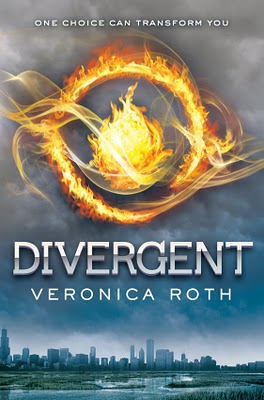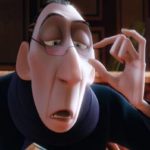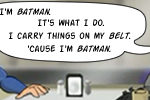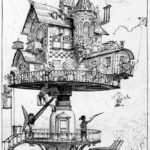Post-Apocalyptic And Dystopian Fiction
One of the hottest trends right now is dystopian and post-apocalyptic fiction. I was reminded of this recently when author friend John Otte reviewed Wastelands: Stories of the Apocalypse, a collection of dystopian short stories by such authors as Stephen King, Orson Scott Card, and George R. R. Martin.
Young adult fiction is teeming with dystopian novels. At the crest of the mountain are books like Catherine Fisher’s Incarceron series, James Dashner’s The Maze Runner, M. T. Anderson’s Feed, The Knife of Never Letting Go by Patrick Ness, The Hunger Games trilogy by Suzanne Collins, and most recently, Veronica Roth’s Divergent.
Interestingly, there are also a few Christian novels — for adults, however — that fall into this category: Sigmund Brouwer’s Broken Angel and Flight of Shadows, David Gregory’s The Last Christian, The Mayan Apocalypse by Alton Gansky and Mark Hitchcock, and Bryan Litfin’s Chiveis Trilogy.
The fact that there are Christian novels on-trend is news in itself, I suppose, but I’m more interested in why the culture has taken to this bent toward the downward spiral that might lead to The End.
In some ways, I think an argument could be made that the Left Behind books (Jerry Jenkins and Tim LaHaye) opened the door. Certainly the popularity of those books across religious lines was a clue that the time was ripe for authors to explore the dystopian results of current directions, whether political, technological, social, or religious.
Why this genre has taken hold with young adults is perhaps a different question. In “Fresh Hell: What’s behind the boom in dystopian fiction for young readers?” (The New Yorker, 2010) Laura Miller posits that there’s a different raison d’être. The adult books explore the logical conclusion of the way things are going. The youth novels, however, deal with the now.
It’s not about persuading the reader to stop something terrible from happening—it’s about what’s happening, right this minute, in the stormy psyche of the adolescent reader.
Later, Ms Miller says
The typical arc of the dystopian narrative mirrors the course of adolescent disaffection.
Joseph John Adams (Tor.com) compiled the thoughts of an array of authors in an interesting article (“Dystopian Round Table: The Appeal of Dystopian Fiction“) addressing the reasons why darkly futuristic novels are popular.
Some of the writers who expressed an opinion on the subject said dystopian stories serve as a mirror for us to look at what our world, our society, is and where it is headed. Others said the genre looks at our fears and offers a caution. Joseph Paul Haines said, “I write dystopian fiction to find the balance between my hopes and fears.”
Another author believes the genre is popular because it is cathartic — offering an experience without subjecting us to the horror of actually living it.
Several other authors mentioned the look within which dystopian fiction affords. The good versus evil struggle is inside each person.
One writer mentioned man’s propensity to love tragedy. The idea of reading about people who are worse off is the appeal, with the added bonus that many of the dystopians end with a note of hope.
Some believe the appeal is in the individual-versus-the-system theme that runs through so many.
I have to say, I’ve wondered why this intrigue with a dark future. I’m wondering if this trend might reflect the natural way people see the world when God is not in the picture. But why Christian dystopians, then? Perhaps for the same reason. Through story, the effect of the absence of God or of the Bible on society is clearer and the desires of Man’s heart are laid bare.
What are your ideas? Do you think the “anti-God” trend in western culture has helped create this thirst for dystopian fiction, and if so, in what way?
And by the way, what are your favorite dystopian novels?











































I think at Adams and many who think that bleak nihilism is hip forget that for most teens, the setting might be dark, and full of monsters, but the teen protagonists have agency–they can effect change for the better. Some even promise redemption, though obliquely.
I think the trend toward dystopian fiction has at least one much simpler reason: The war on terror.
Since 9/11, the US has been engaged in a war unlike any it’s ever known. Ten years ago, people who are writers, agents, and editors now were in college, high school, or even middle school. They had a significant coming-of-age moment that day, and to a large degree, this war with no visible enemy has probably very much shaped their worldview. It’s quite a different world from the one where you could say “Germany/Japan/Italy is our enemy.” The guy who lives down the street or sits next to you on the plane could be your enemy these days, and I think that probably shapes the kinds of stories people write and the kinds of stories that appeal to the people who buy stories. I don’t tink it’s a lack of a Christian worldview that’s shaping the trend so much as it’s a world of uncertainty, war, and economic upheaval.
As for why kids read them… My 12-year-old reads anything. He’s equally happy with Collins, Ursula LeGuin, Stephen Lawhead, and David Eddings. He doesn’t look for dystopian stuff, but if it’s there, he reads it. Then he passes it on to his sister, who reads it, shrugs, and looks for another story about a pioneer girl. Kids just have a wide range of tastes, and a large portion of them will read anything they can get their hands on.
Finally, as for the Christian trends… Perhaps it has something to do with the growing realization that we might actually have to stick around for some of the icky stuff in Revelation?? Because, by the way, those same Christian writers, agents, and editors have grown up in the same shadow of falling twin towers…
In any story, I am looking for hope in the midst of chaos. Light in the midst of darkness. Dystopian works give us the opportunity to explore that in a setting so foreign to many of us. Wide-spread desolation, humanity on the verge of utter darkness, or doing their best to climb out of it–these are backdrops, melancholy blackdrops, used to explore the same themes we find elsewhere in writing. I’m a huge fan of dystopian and the blank canvas it offers writers. As a Christian, you raise fabulous questions, and I look forward to exploring the CBA dystopians you mentioned.
Hm. Interesting thoughts. I am writing a book that might be considered dystopian, although the emphasis is more on the persecuted Christians in the story than the dystopian society they’re hiding from – a generation that largely worships the state and looks to the government to provide and solve everything. For me, writing dystopian fiction is a way of pointing out how things would be if people’s ideologies were taken to the extreme. In this case, it’s a political ideology. I’ve written (or tried to write…) another one revolving around the pro-choice ideology as well. For me it’s a way to prove a point.
I don’t necessarily write dystopian, but my fantasy can be a bit dark. So when you asked why would Christians write that, I think its because life can be dark. Very dark. And I like writing that way because when we see the light, its stands out in such stark contrast to the darkness.
Choosing to be light is many times choosing to go the right way rather than the easy way. Its a fight against society, pressure, and even inward desire. Its a life of sacrifice so those following have light, even when you do not.
I write dystopian fiction, but for a general reader, not YA market.
Why do young people want to read it? I can’t speak for them, but I can offer my observations, which may or may not be accurate. Maybe it is because fear is prevalent today, and the world is becoming more Orwellian and/or Huxley-ish, too. 1984 and Brave New World don’t seem so distant in the future anymore.
Many people seem to be more concerned with safety than freedom. It is a matter of opinion as to whether all that fear is totally justified. Fear will make people accept all sorts of things (privacy infringements, draconian laws, etc.) in order to feel safe again. Once fear takes hold in a culture, the future doesn’t hold much allure. Enter dystopian fiction, mirroring where things may (or may not) be headed.
I think that young people feel like the future will be worse than the present, which is understandable, and they want to know how to cope. Maybe the current situation our world is in financially makes kids feel hopeless, and not in control of their lives, their careers, their “destiny.” If I were a young person, I’d feel that way. (If I didn’t have my faith.) Perhaps YA readers feel their future will hold more and more infringements on their privacy, and rights, and endless wars on multiple fronts. Perhaps because the future seems so uncertain right now, and the “culture of fear” that has been created since 9/11, people are drawn to this genre to figure out what may lie ahead, or perhaps secretly hope it all does end, and that something totally different will take its place. And perhaps something better will come of it, eventually.
I don’t think it has anything to do with being Anti-God, personally, because being pro-God doesn’t automatically mean our future on earth is going to be bright. Thinking that the apocalypse will happen soon doesn’t make a person anti-God, does it?
From a writer’s perspective, I think that many dystopian authors write their stories as a cautionary tale, to warn people where we may be headed, to take note of what is going on right now, to look at “the big picture,” and ponder where all of this is going.
I tend to think that dystopian fiction is realistic fiction. Immigrants to the US, for instance, have believed that this is the brave great new world. Progressivism and hope ruled. And for some it is a great world. But for others, and for many other folks who were born here, the dream of utopia is always up against reality. I think many kids are aware of that. Honestly, unless one is protected by money and power, it is hard to see good happening in the world. We know humans too well. There is no western frontier to go to, no moonbase to build; all we have is a forgotten promise. Utopian promise and reality= dystopia. Not really negative, I think. One can believe in God and still feel any world created or inhabited by humans is bound to fail.
Probably my favorite would be That Hideous Strength.
I think young people read Dystopian fiction because it seems to match more of what is in our world.
Like the other commenters, I don’t consider dystopian to be Godless or anti-God fiction.
The best dystopian/post-apocalyptic books I’ve read were in the YA general market: The Giver by Lois Lowry, and City of Ember by someone whose name I’ve forgotten. (and the accompanying movie for CoE which IMO was actually better than the book, surprisingly. :))
In general, though, I’m not much for the genre! I grew up on historical dystopians – tales of the Inquisition and torture of Anabaptists (Baptists/Mennonites/Amish) and other stuff like that – and so I’m thoroughly tired of it.
That being said, I like dark fantasy/sci-fi… just not big on dystopian. 🙂 Unless it’s shot through with rays of hope, like The Giver. 🙂
The first thing I thought about when I read this was the Fallout universe. The games are set in 2200’s after a nuclear war in 2077. Fallout 3 was game of the year… why?
I think it’s because dystopian novels provide a simpler way to show good vs. evil without becoming fantasy. I think teens like it because with post-apocolyptic fiction ( and games) society and it’s masks are ripped away, and you get to see who everybody really is. Youth like to talk about being “real” and few things seem as real as the brutal mornings after the bombs drop.
The stories of the Fallout games are honestly, my favorites- I think novels set in that universe would be good. That Hideous Strength by Lewis is actually- believe it or not- my favorite book of all time. 🙂
My generation is not terribly impressed with the world, now that we’re grown up some. It looks…. pretty bad. It’s meaner, colder (or hotter), sadder, and bigger (or smaller) than we thought it would be, and we are drawn into worlds that reflect that disillusion. What’s more disillusioned than a future which is imperfect?
Joshua, these are great observations, but I’m still left wondering why. Other generations, honestly, faced harder circumstances. But there was a sense that things could get better. Today, young adults don’t seem to have that sense that if only X, Y, or Z happened, things would be better.
In some ways, this is what Carole said about dystopian being disillusioning in a good way. It really is a lie to think that getting a better job or achieving gender equality or eradicating Communism is going to be The Answer.
On the other hand, the hope Christ offers makes such a radical shift in the whole picture. But because it’s on a spiritual plane, I think it’s a lot harder to show.
I need to reread That Hideous Strength.
Becky
I guess… it’s cause people have been saying X,Y,Z would make it better since the dawn of man, and it never really did. 🙂
Maybe it’s harder because the cirumstances aren’t harder? There’s not a lot we can do. The 40’s generation could contribute directly to the war effort. In a lot of ways, it feels as if we’re just waiting to be blown up. (The news always describes combat in the world in the terms of an ambush, after all.) Maybe, if had a chance to start over, it feels like, with a truly tough situation for everyone and nowhere to run, we could change things and we could do great things.
I highly advise it. 🙂
I find hope in a lot of the better post-apopolyptic stuff. Not the best example, but in Resident Evil, there was supposedly a safe haven in Alaska. In Fallout, ther’es the Garden of Eden Creation Kit and the water purifier to bring life again. Or, the ending of Hideous Strength. The Giver is too, maybe. (It is ambiguous.) The capacity for hope in the genre is deep.
I agree, Joshua. In many respects, I think today’s teens have been stripped of purpose. Adults think all they should do is party. And sure, teens buy into that, but it gets stale so soon and then it’s a search for something More. In the end, the pursuit of pleasure always leads to an awareness of the emptiness of that focus. Dystopian seems like a natural outcome.
Becky
Great comments, all.
Amy, I hadn’t thought specifically about 9/11 being the backdrop for dystopian fiction, but it does make sense.
I tend to think, though, that there’s also a Big Brother component (and some of the authors in the Tor article mentioned this) where young people today feel under surveillance. There’s some helplessness connected to it and some inevitability. Of course, I agree that the repercussions of 9/11 brought on a measure of that watchfulness. But so did rising crime rates and attacks against children.
The YA dystopian apparently does give some reason to hope, for the most part. Certainly not all the books in the genre do, however.
It’s the hope component that I thought might tie in a godless society with dystopian. History seems to bear out that a hedonist society gives way to a nihilistic society, where there is nothing to live for and no one to turn to. That yields to despair. But the majority of the YA books don’t do despair, it would seem. At least not yet.
Of the Christian books I named, the ones most nearly like general market dystopian are Sigmund Brouwer’s works (I think — I haven’t read all those titles). Bryan Litfin is definitely dystopian, but so dystopian that it reads more like medieval fantasy.
So, I’m still looking for more titles. I love the inclusion of That Hideous Strength on the list.
Jenni, The City of Ember was written by Jeanne DuPrau. I read book four in the series, The Diamond of Darkhold. That’s a good series, I think.
Carole, interesting to think of dystopian as honest. That’s another angle I hadn’t considered in exactly the way you painted it, but I see why you say it. It fits with what those other authors said about it being a mirror that shows us the world or ourselves.
Love this discussion.
Becky
I have read, among other works
The Hunger Games trilogy
The Tomorrow Code
The Compound
The Dead and the Gone
Life as we knew it
The other side of the island
Time’s chariot
Forest of Hands and Teeth
City of Ember
Which all have dystopian elements, if not startforward dystopias. I don’t really like it much–if it’s got a depressing ending, I like happy bits too. And fantasy is more my type, but sci-fi…I guess I’ll fall back on a quote from The Silmarillion
The one was deep and wide and beautiful, but slow and blended with an immeasurable sorrow, from which its beauty chiefly came
Dystopias just have the sorrow too often, without the beauty.
“Some believe the appeal is in the individual-versus-the-system theme that runs through so many.”
The above gets my vote. Even with a new president and governor (of California) the economy still suffers. It took WWII to get us out of the Great Depression, and who wants a repeat of that?
Youth novels are typically allowed to be a little more hopeful than adult fiction. There’s always that “You can do it!” attitude we preach at kids from Day One. I just re-read “The Hunger Games” trilogy where a jaded 16-year-old girl takes on The System. (Don’t worry: no spoilers here.) After finishing it the second time, I contemplated what a more redemptive, biblical worldview would bring to the same story.
I’ve wondered what my own attraction is to the Post-Apocalyptic and Dystopian genres. My conclusion is that when you put people in extreme situations, you really get to see what they’re made of, and those are about as extreme as it gets. (I watch Survivor and Dancing With the Stars for the same reason!)
Note: Other than the “Left Behind” series, the only “post-Apocalyptic” Christian fiction I’ve encountered is Terry Blackstock’s “Restoration” series. One family struggles to survive after what is thought to be an EMP event that sends them back into the last century. I enjoyed story because the author took them into an extreme situation without the controversy of interpreting end-time prophecies.
I read the Restoration series, but the sheer chance in the last one annoyed me terribly. All that might have changed the ending was if the girl wore a different shirt…and that was so pointless!
Galadriel, it’s not the greatest writing, but I was taken with the simple question, “If life got this hard, would I share with those who had even less?” And “If the hardest thing of all happened, what would that do to my faith in God?” (Still avoiding spoilers)
Interestingly enough, Divergent IS a Christian book. It’s not so strange really, and I’m delighted to see the Gospel storm the ramparts of dystopian fiction which might will have started with H.G. Wells (The Time Machine) and definitely with H.P. Lovecraft. It’s been around for decades. It is usually rather bleak. Divergent, isn’t. It’s not my favorite future genre but I’m delighted to see Veronica Wells beacon there in the darkness.
Scott Westerfeld (The Uglies series, Leviathan) said once that he thought dystopian stories were attractive to children because high school is a a dystopia.
I find that there is a great struggle of good against evil in dystopian books, which is what attracts me. And I like the fact that often the evil is dressed up to look like good:
The government will help you and make you safe–looks good. Until it starts telling where to work and what to wear and when to pick your nose.
Technology will make your life full of fun and beauty and you will never be bored or sick or ugly. Sounds good until you find that you are wasted away from lack of work and unable to do anything meaningful because your body died while your mind was hooked up to the virtual life machine.
Isn’t this what all dystopians are about? What we thought was good really turns out to be our worst nightmare?
Satan disguises himself as an angel of light.
And then there’s the old story about the woman who saw that the fruit was desirable and so she ate it. And her beautiful garden was filled with thorns. The fruit looked good, and it entrapped her.
I think it’s a hunger in the human heart to get back into the garden that makes dystopians attractive.
@Michelle, I didn’t see the gospel preached in Divergent. I loved the book and<a href-“http://www.sally-apokedak.com/whispers_of_dawn/2011/05/divergent-im-on-the-bandwagon/”>reviewed it, in fact. </a> But I wouldn’t call it a Christian book. The author–Veronica Roth–is a Christian and appears to be writing from a Christian worldview. But I don’t think she preached the gospel. Did I miss it?
I’m not getting the html deal down here, obviously. How do you do links?
Oh, I see. They don’t light up until you highlight.
If you want to read my review, it’s here.
🙂
[…] a related note to yesterday’s post from Becky on dystopian fiction, a heated discussion arose the other day in response to an article by Wall […]
I have 3 blogs that are all for books that I read and review. One is for children/young adult books. On that blog I lean towards young adult books both fiction and non-fiction. I scan the aisles at our library and book store looking for new reads, educating myself about what is out there. I also chat with the book store clerk asking her what are the books that are hot for specific age groups. Since I just started this blog a little over a year ago I’m learning quick that high school age youth are drawn (most of them) to books like Twilight series, Vampire, Werewolf, Occult, Dystopia, etc. These kind of books (subject matter) make me want to stop reading, I find them boring, but as a reviewer I feel I need to read at least a few. I also want to know what the craze is about and educate myself about this selection of books. Another words I can’t comment on them if I don’t know what they are like. Having said that I will state that when I was a youth it was Stephen King that I read for a couple of years. I was looking for an escape from my “world”, that I thought was so bad. But, sometimes that escape is worse than where the reality is.
Thank you.
Actually, Becky, statistically, children are as safe now as they were in 1970–perhaps safer. We just hear about everything much more now. We do have a culture of fear and tension, I think, and I think some of the blame has to lie with the proliferation of information on the web, the 24/7 news channels, and the weird parasitic relationship between the general public and the people who give us news. We complain that it’s all bad news, but they know that what bleeds, leads. We keep watching, and they are driven by ratings, so they keep giving us what we want. It’s a frightening spiral.
I occasionally read Lenore Skenazy, the ultimate free-range mom, and she has some good things to say about how safe kids are these days. This is a good example: http://stats.org/stories/2009/land_free_home_scared_sept2_09.html
I try really hard not to be a “helicopter” parent. I think I fall somewhere in the middle. I’m not neglectful–my kids are fed, clothed, churched, educated, and all four are excelling in school. But on the other hand, I do miss things, sometimes just because I don’t want to go. And I’m slowly but surely letting up on the reins to let them roam a little freer in the neighborhood. It’s a tricky balance, and I have to do a lot of deep breathing… 🙂
Amy, I agree with what you’re saying about the media. No doubt we see things, sometimes in other parts of the world, that kids never used to think about, let alone witness.
But I think Columbine changed things. Kids attacking kids with intent to kill, and the whole bullying thing coming to light. Metal detectors at school doors. Backpack searches and doing away with lockers and surveillance cameras and so much more. All this might make kids safer, but I don’t know if they feel safer.
I think Joshua hit on something important, too — kids today don’t have a sense of purpose. I can see why many would gravitate to dystopian books that seem to shed light on their experience.
Becky
It looks like I am about a year late to this conversation, but I want to add something. It’s a bit of self-discovery. I’m at the lead of the GenX generation at age 43, and find that th standard description of what GenX is all about fits me rather well. I was raised within a rather strict evangelical substitutionary atonement theology and in my GenXedness have doubted and questioned and wondered and blogged and read and read and read and read and have done the truly GenX thing of deconstructing my faith/belief to shake out what is fantasy and what is real. What is real about God, about the world, about life, about relationships. And in that process I have discovered that it can be challenging to find the bits and pieces which are real. There are so many biases and drives and motivations behind information that at times it can be dizzying to perceive which trees in the forest actually are real and which are just illusions. Along my deconstruction and rebuilding process, I have noticed within myself a strong attachment to apocalyptic or dystopian stories that I can see reaches even back into my childhood. I’ve been thinking even more about it as I have found myself really seriously into “The Hunger Games” trilogy, more specifically the themes and philosophies that run through it. As an aside, I do find it a bit humorous when I see someone review the series and say that it is about kids killing kids, because that is such a superficial understanding of what the book is really about. And while I realize it is marketed to and supposedly a story for “teens,” the philosophical threads running through the story are actually very deep and much more for adults who have a certain amount of life experience underneath them. I doubt that a teen can really truly understand the magnitude of what the book is trying to say in any way other than a rote intellectual fashion. Getting back to my point, I have wondered why this attraction to apocalyptic tales is within myself, and I think I have come to a bit of an understanding which is affirmed by one other who has commented above:
“Youth like to talk about being “real” and few things seem as real as the brutal mornings after the bombs drop.”
In a world where realness and truth are so intricately veiled, an apocalyptic situation strips much of that away. It becomes very clear what you must do to exist. What is real and what is not come much more readily into focus. There isn’t so much to distract. I think that this is why I love apocalyptic stories. Sometimes I almost think that if I was there in the story experiencing it, I would actually feel relief, which is of course an idea that may be partially true but which is veiled as real and complete truth.
I certainly can’t and don’t want to speak for everybody, but there’s my thoughts about what may be driving this genre’s popularity.
[…] Nietz and Rebecca LuElla Miller both offer great […]
The Bible is full of accounts of civilizations (plural) collapsing. Lamentations can be seen as post-apocalyptic. Babylonia and the Northern Kingdom of Israel can be viewed as dystopias.
Christians can write these genres, but we have a hope that does not disappoint. And I’m not talking about a small band of plucky teenagers.